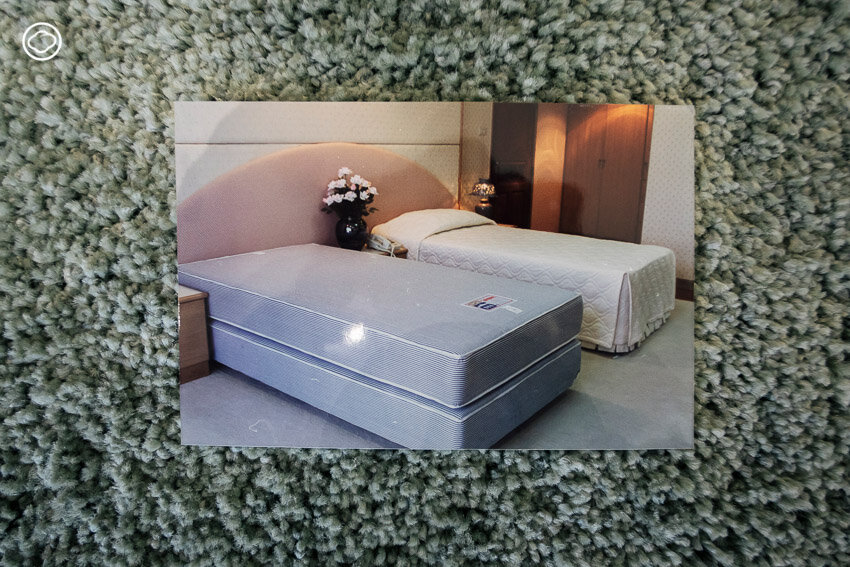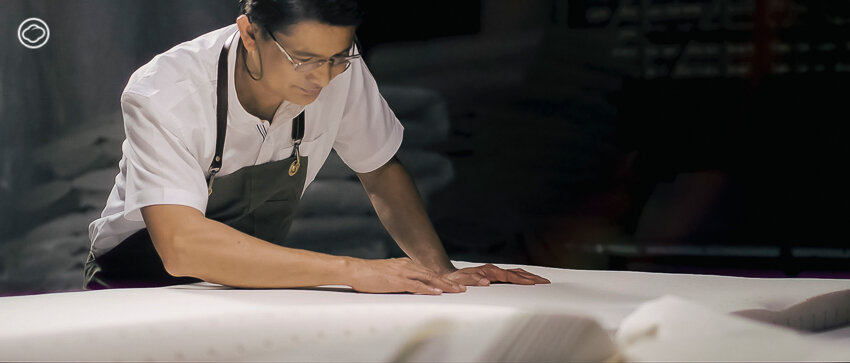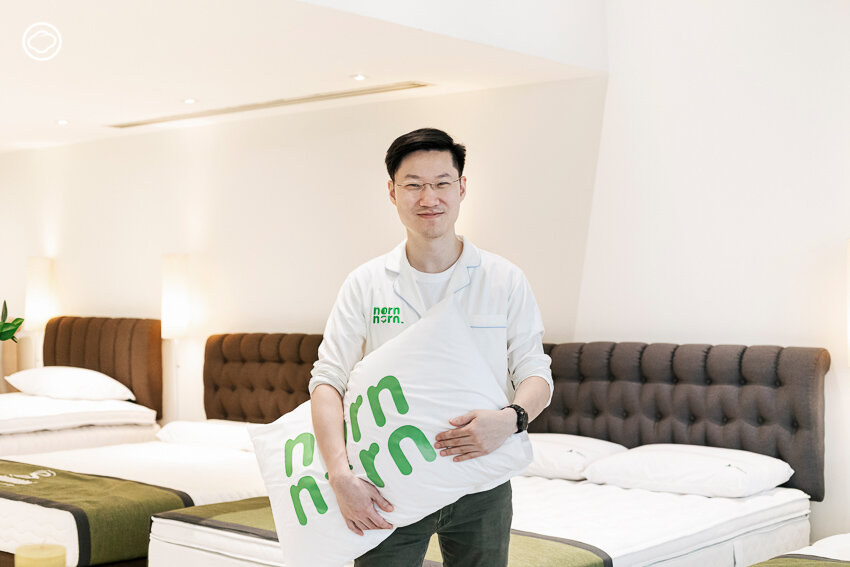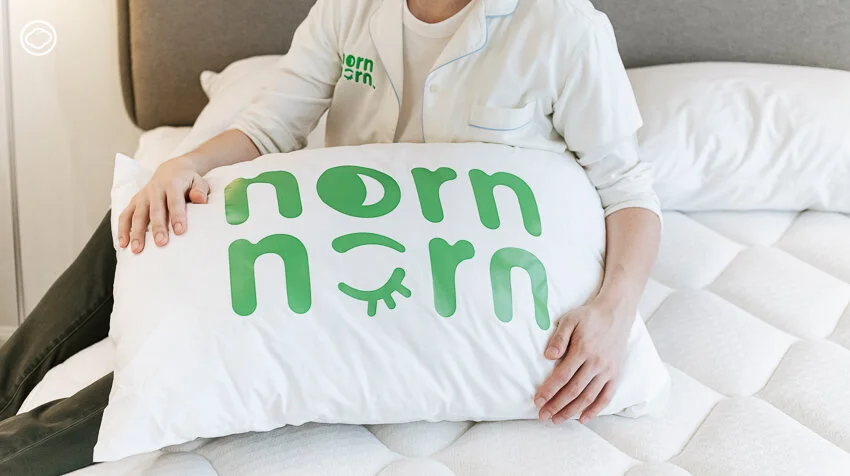Bedtime Stories
A chat with Ratana and Nophol Techaphangam, third and fourth-generation heirs to an 88-year-old Thai mattress business. From a cotton mattress shop in Bangkok’s Little India (Pahurad) to Thailand’s first spring mattress manufacturer and the creation of today’s new [business] opportunities with an eco-friendly start-up.
Translated from the original Thai article by Naphasorn Sriwilas first published on The Cloud on June 15, 2020
nornnorn is a high quality mattress rental service start-up with rental fees starting from just 65 baht per month that aims to solve the mattress industry’s two new, big problems.
The first is hospitality businesses’ [lack of ] access to good quality mattresses - key components [of the businesses] that are no less important than service - in the absence of big capital investment.
The second is [how to] recycle mattresses at the end of their lives properly and in an eco-friendly way.
© Maneenoot Boonrueng for The Cloud Magazine
The start-up was founded by a fourth-generation heir to an 88-year-old Thai mattress business. As we look back to the heirs from the earlier generations, we discover that in their time all were start-up founders in their own right.
Starting from the great grandfather and his older brother who set up a cotton mattress shop in Bangkok’s Little India during the time when Thais still preferred to sleep on mats or wooden boards, and cotton mattresses were a luxury that could only be found in wealthy households.
To the second-generation heir who left [the business] to open a mattress store in [the Bangkok neighbourhood of] Gingpetch, handcrafting cotton and foam mattresses before discovering how to manufacture spring mattresses and co-founding Thailand and Southeast Asia’s first-ever spring mattress manufacturer with a friend and creating the mattress brand ‘Darling’ for Thailand and the region.
From helping her father with the business from a young age, the third-generation heiress became one of the mattress industry’s experts. She and her husband led Darling into Thailand’s high-end hospitality market before stepping away to establish a [new] company and produce mattresses under ‘Springmate’, a brand that has gained widespread acceptance among hospitality businesses in Thailand, Southeast Asia and South Asia alike.
And then to the fourth-generation heir, a former physics and economics student [with degrees] from England, who built up the brand Springmate, expanded its market, and reformed the business before stepping out to create a mattress rental service platform that features good quality mattresses from various brands with rental fees that are truly accessible.
© Maneenoot Boonrueng for The Cloud Magazine
The Cloud has a date with Ratana Techaphangam, a third-generation heiress and co-founder of Somphol Bedding and Mattress Industry Co., Ltd., the owner of the mattress brand ‘Springmate’, and Nophol Techaphangam, a fourth-generation heir behind ‘nornnorn’, to learn how the mattress business has been done [and evolved] over the past 88 years [amidst ever-changing] business environment.
It’s hard to say whose challenges were bigger than whose. [There was a] time when unique products were in demand. [Then another] time when trust was most important. [And yet another] time when a retail war could have ended [it all]. [And then a] time when handsome profits are not in the discussion, but sustainability becomes more key.
Let’s jump onto bed and listen to this tale together.
This bedtime story may be a bit long. If you fall asleep, we won’t curse you for coming back and finishing it after waking up.
(Note: Each person is addressed as per Nophol, the fourth-generation heir.)
Businesses: Yong Sun Nguan Mattress Shop, Sukwattana Mattress Store, Thai Quilting Production Co., Ltd., Darling Mattress Co., Ltd., Somphol Bedding and Mattress Industry Co., Ltd., and nornnorn, mattress rental platform.
Year established: 1932
Age: 88
Type: Mattress and bedding manufacturer and distributor
Founders: Great grandfather and his older brother (Yong Sun Nguan Mattress Shop, 1932)
Second generation: Prasert Prasertwanich (Sukwattana Mattress Store, 1959; Thai Quilting Production Co., Ltd. and Darling Mattress Co., Ltd.)
Third generation: Somchai and Ratana Techaphangam (Somphol Bedding and Mattress Industry Co., Ltd., 1991)
Fourth generation: Nophol Techaphangam (nornnorn, 2018); Krisapon and Nataporn Techaphangam
Bedtime story
Once upon a time… going back over 80 years ago.
[Nophol’s] great grandfather and his older brother were sent to Thailand from China to start a business. Together they opened the ‘Yong Sun Nguan’ cotton mattress shop in front of a market in Bangkok’s Little India in 1932.
‘Yong’ means forever, and ‘Sun Nguan’ smooth and prosperous.
After a while, the great grandfather fell gravely ill and returned to Shantou, his hometown, to recuperate. He died some time later while the business [in Bangkok] continued.
When [Nophol’s] grandfather, Prasert Prasertwanich, turned 13, his uncle got him to come over from China to join and rightfully receive his father’s share in the business. The enterprise continued smoothly until Grandpa Prasert, then 30, left to open a mattress store under the name ‘Sukwattana’ in Gingpetch in 1959.
Thailand and Southeast Asia’s first-ever spring mattress manufacturer
The name ‘Sukwattana’ came from the wish to provide customers with a good night sleep, which would [in turn] help the business prosper.
[‘Suk’ means happiness, and ‘Wattana’ to prosper.]
© Maneenoot Boonrueng for The Cloud Magazine
In addition to being the first mattress store in the area, Sukwattana also produced and sold mattresses to other stores in [the neighbourhoods of] Gingpetch, Dam Bridge, Mansri and other parts of Bangkok as well as across Thailand. In time, it made the area around Bangkok’s Rajthevi Fountain intersection the city’s mattress district.
Back then cotton mattresses had [just] started becoming popular among the middle class due to their value for money and durability. They were soon replaced by foam mattresses, which were quicker to produce while affording the same level of firmness with the added benefit of not collecting dust.
After supplying bedsheets and pillowcases to American GIs stationed in Thailand during the Vietnam War, Grandpa Prasert became well acquainted with the soldiers enough to be asked to help repair sagging spring mattresses, a job that opened his eyes to the foreign spring technology that had already been around in other countries for many decades.
Since spring mattresses were softer and more comfortable than cotton and foam mattresses, Grandpa Prasert began studying the technology and eventually co-founded Thailand and Southeast Asia’s first-ever spring mattress factory with a friend in 1964.
© Maneenoot Boonrueng for The Cloud Magazine
© Maneenoot Boonrueng for The Cloud Magazine
Good night, Darling
Some time later, Grandpa Prasert parted ways with his business partner to found a spring and foam mattress factory under the name Thai Quilting Production Co., Ltd. in 1978.
He imported quilting machines from Europe to quilt the mattresses’ upholstery fabric instead of leaving them plain, making his mattresses more luxurious and durable. The factory also employed spring coil assembling machines that could assemble spring coils tens of times faster than human hands and at a higher quality.
All the while he created the brand Darling.
“The name of the brand came from my father’s liking the word ‘darling’,” Ratana tells us.
Among the six siblings, Ratana, the third child, and her older sister were considered important hands that assisted the business, from sales to production to inventory management and deliveries.
“I started working at my father’s store from the age of 12, taking care of sales, invoicing, and cotton and foam mattress production. I helped stitch cotton mattresses, bedsheets and pillowcases whenever we were short of staff. After I turned 16, sometimes I drove a six-wheeler to deliver mattresses to our customers myself when we didn’t have enough drivers.”
Apart from being clever in coming up with a brand name, Grandpa Prasert was also good at generating sales.
By studying how products were advertised abroad, Grandpa Prasert created a sensational TV commercial of the era by getting a steamroller to run over a mattress to demonstrate the product’s strength and durability. Thereafter the whole of Thailand came to remember [his mattresses] as ‘steamroller mattresses’.
In addition, after a chance encounter with a public signpost concessionaire, Grandpa Prasert spotted the advantages of using signposts for advertising and offered to sponsor the production of all signposts in exchange for a small advertising space underneath. As a result, his adverts and the name Darling mattress spread to every intersection nationwide.
© Maneenoot Boonrueng for The Cloud Magazine
Through her early involvement in the [business], Ratana [gained expertise] in mattress production. She understood the differences [between each product] and could come up with solutions to her customers’ needs. Wherever she learned that a mattress had problems, she did not hesitate to disassemble it and investigate no matter which brand the mattress was from, thereby [building up her expertise in mattresses].
“What were the materials inside? How were they assembled? At first I thought only of helping our customers repair their mattresses, but I unexpectedly got to learn deeply about the materials. For example, very few people at the time knew that Thai rubber latex gave a cool feel. It’s true that rubber latex was used worldwide, but that latex was semi-synthetic. In Thailand we used 100% natural rubber latex, which made mattresses cooler, softer and more durable.”
The knowledge, together with frequent opportunities to go on business trips abroad, enabled her to learn the art of mattress making. This, combined with her experience in designing different kinds of mattresses, imbued her with the greatest expertise in the products.
“I once designed mattresses for a yacht. The shapes were unusual as they had to match the curvature of the yacht. I made the measurements, came up with the designs, made the cuttings and assembled the mattresses within the three days that the yacht was moored. It was a challenging job, but the customer was impressed and helped spread the words.”
Springtime in the mattress business
After falling in love with and marrying Somchai, a top salesman working for a competitor, Ratana and her husband used their combined talents to help Darling successfully venture into new markets.
“Previously my father had focused on mattress stores and low-end hotels. In the first year that Somchai joined the business, he made a thunderous amount of sales by offering Darling spring mattresses to many famous five-star hotels at a time when the hospitality industry was growing in Thailand and neighbouring countries. Leading hotels used to use only mattresses imported from abroad,” Ratana shares.
© Maneenoot Boonrueng for The Cloud Magazine
After that, in 1985, the two of them were tasked with supervising Grandpa Prasert’s new mattress store in [the Bangkok neighbourhood of] Ladprao and expanding Darling’s presence in Thailand’s high-end hospitality market before establishing their own company, factory and Springmate mattress brand in 1991 using new machines and manufacturing technologies that resulted in even stronger and more durable products.
© Maneenoot Boonrueng for The Cloud Magazine
© Maneenoot Boonrueng for The Cloud Magazine
When hit by the 1997 financial crisis, Springmate received a huge opportunity that enabled the brand to sail right through - a 10,000-mattress order for the 1998 13th Asian Games - even though the brand had just started and the factory was very small compared to the competitors’.
How did Springmate win [that order], we ask.
“The committee had clearly announced that it would select based on quality. After inspecting factories to see the production capability of the fourteen brands, in the final selection round the committee asked for letters of recommendation and gave [us] only one day to get them. Since we had been in the industry for a long time and had good relationships with the head housekeepers of many hotels that were our customers, everyone helped out and urgently issued us recommendation letters that in the end won us the job while our competitors couldn’t find even a single one.”
Ratana told us that a mattress is a product of which one cannot see the inside, so trust is of the utmost importance, especially that from hotels and hospitality businesses for which mattresses are no less important than service.
“Important is the sleep experience. If guests sleep on sagging mattresses, they probably will not come back again.”
The attention to quality made Springmate renowned in the hospitality industry as a manufacturer of good quality mattresses. If one thought of quality mattresses, Springmate was a name that came up even though it did not do any marketing.
“My father taught me that, no matter what we do, we have to do our best and to our utmost confidence. We very often meet old customers bringing in their child who is about to get married to select a new mattress. That gives us more confidence.
“We always say that a mattress is something of which one cannot see the inside. A salesperson can use pretty words to convince a customer to make a purchase, but what the product is actually like the customer will never know until he has used it. We therefore have to do our business honestly to engender confidence among our customers. This is the most important. We will never betray our customers. This is a promise.
“Apart from being honest, we also want to help solve problems for our customers because, in addition to making our heart happy, we get to understand their pain points and create new products, new services and channels, and new businesses,” Ratana shares with us what she has learned over the 50 years of running a business that is now ready to be passed onto her children.
Now that all is well with the business, it’s time for the third-generation heiress to return to her dream of becoming a Chulalongkorn [University] graduate at the age of 58
As time passed and the business became more settled, from not having the opportunity to go to university during her teenage years due to her involvement in the family business, Ratana decided to study for a bachelor degree at Ramkhamhaeng University before completing her masters in accounting at Chulalongkorn University at the age of 58.
© Maneenoot Boonrueng for The Cloud Magazine
“When I studied at Ramkhamhaeng, my classmates were 26-27 years old. As friends, they shared with me everything that was going on at home, so I got to understand the feelings that children had towards parents like me. So I told myself that I would never do those things to my children. I would listen to them first with my heart and respect their thoughts and ideas. So I ended up giving them opportunities to do the things they wanted.
“And while I was studying for my masters, I came to realise that 80% of what’s in the textbooks were what I had done through trials and errors throughout my life without knowing that it was all written in business textbooks. Knowing that gave me confidence. Whatever I have not tried before I immediately want to,” Ratana says.
Reform and get ready for battles in the fourth generation
“When I was a kid, I asked [myself] that, ‘if our society were to collapse, what knowledge would be necessary for us to create a new civilisation, beside medicine and engineering’. Finally I chose to study physics,” the fourth-generation heir answers when asked the reason for his choice of university studies.
After completing his bachelor degree in physics with theoretical physics with first-class honours from the University of Manchester and a postgraduate diploma in economics from the University of Cambridge, Nophol returned to work on building up the brand and developing the business in 2005.
“[Up until then] our business had been well-known in the hospitality and OS&E (Operating Supplies and Equipment) segments. Our marketing was based mainly on the trustworthiness that we had engendered among established hoteliers. But as time passed and our target group grew, we started getting questions from a younger generation of potential clients why we were not known among general consumers or in the retail market at all if our products were that good.
© Maneenoot Boonrueng for The Cloud Magazine
Even though Springmate’s image was revamped to make it worthy of the family’s age-old legacy, competing in the mattress business at the time when Nophol took up the helm was far from easy due to more aggressive competition from well-known brands from abroad and the changing nature of the retail market that had moved away from small mattress and furniture shops to modern department stores with strong bargaining power and, later, large, influential furniture stores.
“Springmate’s image in the OS&E and hospitality segments has from the past to present been high-end both in terms of pricing and quality, but in the retail market we were placed in the lower-end when I first joined the business because Springmate had made it clear that it was a Thai brand. Getting into leading department stores was difficult because they preferred famous brands from abroad,” Nophol tells us the problems he faced.
An important turning point came when Ratana and Nophol decided to join the Ministry of Industry’s ‘Manufacturing Development to Improve Competitiveness Programme’ (MDICP) in 2008 to upgrade the business’s production system, management and marketing to match the company’s now bigger size with advice from experts.
© The Cloud Magazine
© The Cloud Magazine
“An important goal at the time was to get our factory ISO-certified. To achieve that we had to write down all the production processes in detail. At the same time, from the advice we received from the accounting and marketing experts, we came to understand the reasons behind and effects of our failure in the retail market to the point that we eventually temporarily withdrew from the segment to find a balance and step forward more steadily.”
Soon after, Nophol found a team with extensive experience in the retail furniture business to join the company and help Springmate gain access to appropriate sales channels, enabling the brand to return to the retail segment and become successful to this day.
The next big task is to reform the management with an enterprise resource planning (ERP) system that uses computers to control the company’s production and overall management, enabling the company to track production cost in real time and have more accurate, real-time information to aid decision making.
“That was what our company badly needed at the time. We wanted to know the real production costs to appropriately price our products, because our company had thousands of items - from those that we manufactured entirely ourselves to those that we partially manufactured to those that we just traded - and the costs of raw materials and goods were much more volatile than they had been previously. Our own business process was also a lot more complicated.”
Nophol shares with us what happened during the ten years he spent with the family business before passing the baton to his younger sister and brother and dedicating himself to a new venture that sprung out of the family’s mattress enterprise.
Waketime story: From customers’ pain points and wish to solve environmental issues
“While I was working at the family business I met a number of challenges that seemed to be growing by the day, both from changing circumstances and alarming competition from China. If we played the same game, we might be able to handle them then, and we might be able to handle them for the next ten years, but eventually we might lose. So I asked myself, ‘why don’t we create a new game of our own, a game that will answer today’s pain points. What are the issues faced by our customers that no one has addressed yet.’”
And Nophol’s new game is to create a business based on the Circular Economy concept that will ensure products’ longevity and their return for recycling to help reduce waste, maximise the usefulness of materials and natural resources, and slow down global warming.
© Maneenoot Boonrueng for The Cloud Magazine
Thus was born ‘nornnorn’, a quality mattress rental platform with monthly rental fees starting from just 65 baht per mattress in Thailand, or 1.9 US dollars elsewhere, that helps all levels of hotels, resorts and hospitality businesses gain access to quality mattresses.
Before [nornnorn], smaller hospitality businesses with insufficient budget to purchase quality mattresses had to settle for low quality, uncomfortable, undurable mattresses to serve their guests. Also, hospitality businesses almost everywhere in the world lacked a way to dispose of used mattresses in an eco-friendly manner.
nornnorn’s rental contracts last from seven to ten years. At the end of a contract, nornnorn will collect the used mattresses back, disassemble them and properly recycle [their components]. [Between now and then] nornnorn will carry out research and develop ways to increase the economic values of all the materials that will be reclaimed [from used mattresses] from the very low now to the levels where recycling becomes worthwhile.
“During the ten years with the family business, I saw that most hotels did not have enough budget to purchase quality mattresses to serve their guests. [This was] partly because mattresses were the last items that hoteliers would purchase before opening their properties, by which time most would already have spent all the budget on the construction and interior decoration, which meant that there were fewer opportunities for them to select good mattresses. Instead of paying for mattresses that would last ten years, they ended up having to replace their mattresses every couple of years and spending more than they would otherwise.
© Maneenoot Boonrueng for The Cloud Magazine
“In addition, there started to be more and more clients wanting us to help them dispose of their old mattresses because they couldn’t get rid of all of them even by selling them to their employees, or the mattresses may be beyond re-usability or repair, so I wanted to find an eco-friendly way to dispose of used mattresses.
“Until now there is no mattress recycling because it’s not a business that makes money. Used mattresses are landfilled or burned, which causes pollution and microplastic problems in the ecosystem. Every year hundreds of millions of mattresses across the world are disposed of improperly.”
Nophol tells us that he’s hoping to give small hospitality businesses a chance to access quality mattresses and enhance their ability to compete with big hotels. At the same time, from its sales projection, nornnorn may help more than 2.2 million mattresses from getting disposed of wastefully and give a new life to over 39,000 tonnes of materials reclaimed from used mattresses over the next five years.
Currently nornnorn has hotel clients both in Thailand and Indonesia. General consumers still have to wait for the development of a FinTech system to [assist nornnorn in] managing the risk of default [that may arise from] customers not paying the rental fees. If that’s successful, we will probably get to sleep comfortably and worry-free on good mattresses soon.
Nophol tells us the reason why he didn’t start ‘nornnorn’ under the family business from the beginning is that he wants the flexibility and the platform to be open to other quality mattress brands.
In the near future, as tourism recovers from the COVID-19 outbreak, Nophol believes nornnorn will have a chance to grow and be in demand because hoteliers will change their investment plan and delay capital expenditures for as much as possible.
Before leaving, we ask Nophol to end our chat with a classic problem when it comes to taking over a family business as well as a way to handle it as befits a four-generation-start-up family.
© Maneenoot Boonrueng for The Cloud Magazine
“Clinging onto past success is a very big trap. What worked well in the past might not necessarily work well today. And NextGens may not be able to comment against that since we have never been in [that same kind of] situation.
“What is strange is that when the earlier generations started their business, they all started with a courage to try and take risks, but once they became successful, all that courage just disappeared.
“My parents themselves stepped out of my grandfather’s business to create Springmate and all the other businesses that we have today. Now is the time for me to step out and find ways to do new things.
“Knowing the stories of the earlier generations has given me the courage to do that. Now it’s our turn to be pioneers like they were. I’ve come to appreciate deeply that it was probably not easy in their times, but still they made it.”
We can’t help but feel proud on behalf of everyone hearing that. It is probably too premature to say that this is the end of a bedtime story called ‘nornnorn’, but [what we can appreciate now is] the beauty of the near-century-old legacy of this Thai enterprise.
————————————————————
Click here for other stories.
















